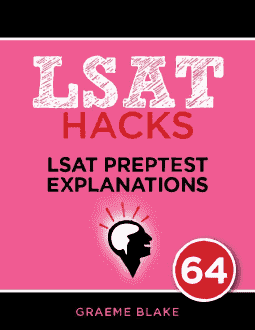QUESTION TEXT: Medical researcher: Scientists compared a large group…
QUESTION TYPE: Weaken
CONCLUSION: Stretching doesn't help joggers prevent injuries.
REASONING: A large group of joggers was split into two. One part stretched, the other didn't. Both had the same injury rate.
ANALYSIS: Consider this: “People who inject insulin live about as long as people who don't. Therefore insulin has no effect on health.”
I make the same flaw as in the stimulus: some people (diabetics) need insulin, and that explains why they take it. They live as long as non-diabetics because they take insulin. It's silly to say insulin has no effect. Some joggers might know they'll get hurt if they don't stretch, and so they stretch often. Whereas joggers who don't get injured don't stretch. The stretching protects the first group, and brings their injury rate to a normal level.
___________
- “Lower” is incredibly vague. Maybe the rate was .0001% lower, which is just randomness.
- How much difficulty did those joggers with injuries experience? Did this affect their future injury rate? And how “many” did this affect? 150 out of 50,000 had difficulties (that's still “many”). This information is too vague.
- If stretching works, then it would prevent the preventable injuries. It makes sense that the remaining injuries couldn't be prevented. That doesn't mean stretching wasn't useful. This is like saying fire extinguishers don't work because most destructive fires couldn't have been stopped by a fire extinguisher.
Also, “most” is as low as 51%. Maybe stretching can reduce the other 49% of injuries, such as pulling a muscle. - CORRECT. Here we go. The joggers who stretched normally had a higher risk of injury, but their injury rate ended up the same. Stretching likely helped lower their rate of injury.
- This answer talks about severity of injury. The conclusion talks about likelihood of injury. Also, “Certain forms of exercise?”. Does that include jogging, or does that just refer to weight-lifting, sprinting, swimming etc?.

Free Logical Reasoning lesson
Get a free sample of the Logical Reasoning Mastery Seminar. Learn tips for solving LR questions


You’re right about C). We can’t say stretching is useless because it couldn’t prevent most jogging injuries like falls and collisions. After all, they’re not stretch-related injuries or injuries that could have been prevented by stretching. If that’s the case, then why wouldn’t C) weaken the author’s argument. We know the number of injuries is the same among both groups of joggers but we know nothing about the injuries itself. If C) were true, how would it not weaken the argument? Looking forward to your reply!
C is irrelevant. Let’s say 20% of injuries are relevant to muscle tightness, and 80% aren’t. Stretching is obviously relevant to the latter 80%.
But it might still prevent the other 20%. So, if stretching does relieve muscle tightness and prevent those 20%, then stretching does prevent injuries.
C is like saying “A bulletproof vest won’t protect you from gunshots, because most deaths occur due to heart disease and cancer. A bulletproof vest would have no effect on these diseases”.
From what I can see, there’s a simpler way to frame this. The claim we need to weaken is that stretching DOESN’T help prevent injuries. If it is true that stretching DOESN’T help prevent “most” jogging injuries (the proposition in C), then, if anything, we are STRENGTHENING, not weakening, the researcher’s position.
So (I think?) we don’t really need to think about percentages, and what’s happening with the 20% of injuries for which stretching may (or may not) have any effect.